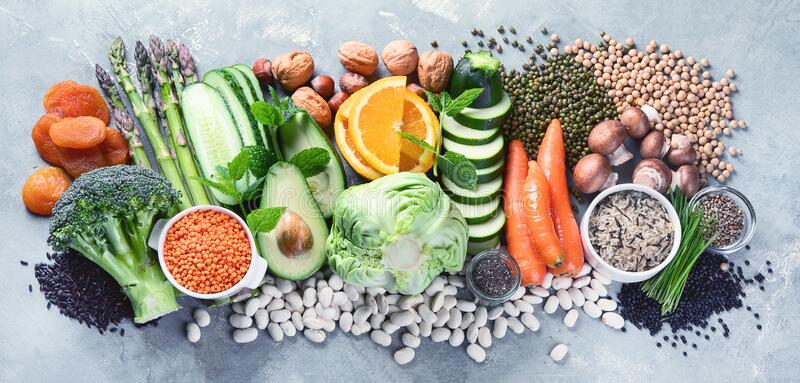Plant-based diet: pear-fect or kale no?
September 6, 2021
I love the environment and I love my body. Both hold incredible value: we can honestly say that no one would survive without these two things (that makes them pretty valuable, right?). There are so many ways to practice good stewardship when it comes to your body and the environment. One way that has always piqued my interest is plant-based diets.
There are so many (and I mean SO many) different articles, papers and opinions in the mainstream media that make it difficult to find the information you need to make a well-informed decision. This definitely applies to the world of health and fitness. For a while, there was a cloud of confusion and uncertainty around plant-based diets and whether they were actually good for your health.
When I was researching this topic for myself, I was blown away by the benefits. Since then, multiple studies have shown evidence that a plant-based diet can improve someone’s health. The benefits range from reducing the risks of heart disease to weight loss to brain health. Even if a fully plant-based diet seems like too much (or you just really love bacon), there are ways to incorporate this “diet” into your routine.
In this article, we’ll explore how a plant-based diet can be beneficial, how you can adjust your current diet, and what you need to know if you do decide to make the change.
So, what is a plant-based diet? The foods that fall under “plant-based” are pretty obvious: vegetables, fruits, nuts, whole grains, legumes and seeds. Basically, any whole food and plant fall under this title. There are also plenty of plant-based alternatives to things that are usually meat-based (think burgers and chicken).
There are a variety of different diets out there. A quick review of those diets are as follows:
- Vegan: No animal products (this means they exclude dairy, eggs, and even sometimes honey)
- Vegetarian: Excludes all meat/poultry foods but may include eggs and dairy.
- Pescatarian: Essentially a vegetarian diet but includes seafood (fish, scallops, shrimp. etc.).
- Whole Food Plant-Based (WFPB): Highlights whole foods (minimally processed) and usually avoids animal products.
So, what are the benefits of cutting out or limiting animal products in your diet? I grew up hearing that you absolutely needed meat or else you wouldn’t receive the necessary nutrients your body needs. The nutrients mentioned were almost always proteins. However, most plant-based diets give you the nutrients you need to maintain a healthy, sustainable diet.
According to the United States Department of Agriculture (USDA), an individual needs fruit, vegetables, grains, protein, oils and dairy. This means that meat is not an essential part of a healthy diet! Plant-based foods can meet protein requirements, provide all the essential amino acids and improve your health. Our intestines were designed to be long enough to allow slower digestion of plant foods – so your body is A-OK with a plant-based diet. In fact, our livers cannot detoxify excess vitamin A which can come from a meat-based diet.
In addition to this, plant-based diets can also lower the risk for kidney stones and gallstones. When we consume animal proteins, our bodies can excrete calcium, oxalate and uric acid. These are the main components of kidney stones (which are no fun). Gallstones are mostly comprised of cholesterol, which comes from animal products. According to the Physicians Committee for Responsible Medicine, plants are free of cholesterol and rich in “soluble fiber,” which can slow the absorption of cholesterol. It also reduces the production of cholesterol in your body. In fact, a meta-study in 2017 found that low-fat, plant-based diets typically reduce “LDL [low-density lipoproteins, aka bad cholesterol] levels by about 15 to 30 percent.”
Plant-based diets have been shown to positively impact Lp(a) which is an atherogenic lipoprotein that promotes fatty plaque in arteries. When high levels of Lp(a) are present in a body, it can increase the chances of stroke and coronary heart disease. In a 2018 study, researchers found that a “defined, plant-based diet has a favorable impact on Lp(a), inflammatory indicators, and other atherogenic lipoproteins and particles.”
This is one of many studies that show plant-based diets to be a huge part of reducing heart disease risks. A study published in the Journal of the American Heart Association in early 2021 followed a group of almost 5,000 people for 32 years. Researchers were studying the effects of a plant-based diet concerning cardiovascular disease (CVD). The young adults who had a plant-based diet and a higher diet quality score were 52 percent less likely to develop heart issues such as CVD.
For those of you who enjoy meat and don’t want to completely cut it out, there is a bright side. A plant-based diet does not necessarily mean vegetarian or vegan. Most of the research on plant-based diets recommends being “flexitarian.” Keep to plants for the majority of your intake, but don’t be too restrictive of yourself. Stay flexible! If you really want chicken and rice, go for it. The general consensus is that the individual needs to be mindful of what they are consuming, keeping their diet plant-centered.
We can see from the research that has been done on plant-based diets how they can positively impact our bodies (even aiding in the reversal of diabetes!). There are so many benefits to going plant-based, it’s hard to fit them all in one article. But what about the environment?
I mentioned earlier that plant-based diets have an impact on the environment, too. While this area of study is relatively new, what we do know is that plant-based diets produce the least carbon dioxide (a greenhouse gas) and reduce global water consumption. Vegan diets have also been shown to have the lowest land use of all plant-based diets.
A study published in the journal Sustainability in 2019 analyzed which diet would have the least environmental impact on our planet. The conclusion was overwhelmingly plant-based. The researchers said in their study that “In short, the more animal protein consumed in a diet, the higher the water use will be. A diet pattern based only of foods of plant origin offers the greatest potential for reduced global water consumption.” They continued to say that “livestock farming uses 70 percent of agricultural land overall and a third of arable land. On this account, a vegan diet has the lowest land use […].”
In general, the most beneficial diet to both our bodies and our environment is a plant-based one. Incorporating a plant-centered diet into your lifestyle may seem daunting – but it can be really simple. To start, don’t just cut all animal products out in a split-second decision. While this is ultimately the goal, quitting cold turkey (pun intended) is not sustainable. Slowly work your way up to that point.
I found that starting with small things was the easiest way to transition to a plant-based diet. Switch your coffee creamer to a dairy alternative, have a plant-based lunch two days out of the week, etc. Slowly incorporating more vegetables, fruits, grains and other plants will become easier as you go.
Plant-based meals can be really fun and flavorful – don’t limit yourself to salads and rice. There are some incredible recipes out there that support a vegan or vegetarian lifestyle. Just like a meat-based diet, you have to find what works for you. In other words, if you don’t like tomatoes, don’t force yourself to.
One tip that helps me is to change the way you think about meat. We are conditioned to see meat as the centerpiece of a meal, but that does not have to be the case. Try to think of meat as a garnish – it’s a finishing touch, not what is making the meal.
A good thing to keep in mind is that while plant-based diets can be really great for you, it is easy to eat an unhealthy plant-based diet. Pasta and potatoes are plant-based, but they are also incredibly heavy, carb-loaded foods. Eating only pasta and potatoes would be considered plant-based, but unhealthily so. Balance what you eat and make sure you still consume the food groups that the USDA recommends.
Again, just being mindful of what you are consuming is the best way to start the journey! If you do decide to follow a plant-based diet, be sure to keep an eye on your vitamin B12, calcium, iron and zinc intakes. These are the few things that vegetarians and vegans tend to have deficiencies in. Foods that are high in these vitamins and minerals include nuts, spinach, broccoli and whole grains. Most doctors recommend taking a vitamin B12 supplement, as B12 is only naturally found in animal products.
Overall, a plant-based diet has the most health and environmental benefits. Slowly incorporating more fruits, vegetables and whole foods into your diet will satisfy your body’s need for nutrients while also keeping your overall calorie intake lower.


